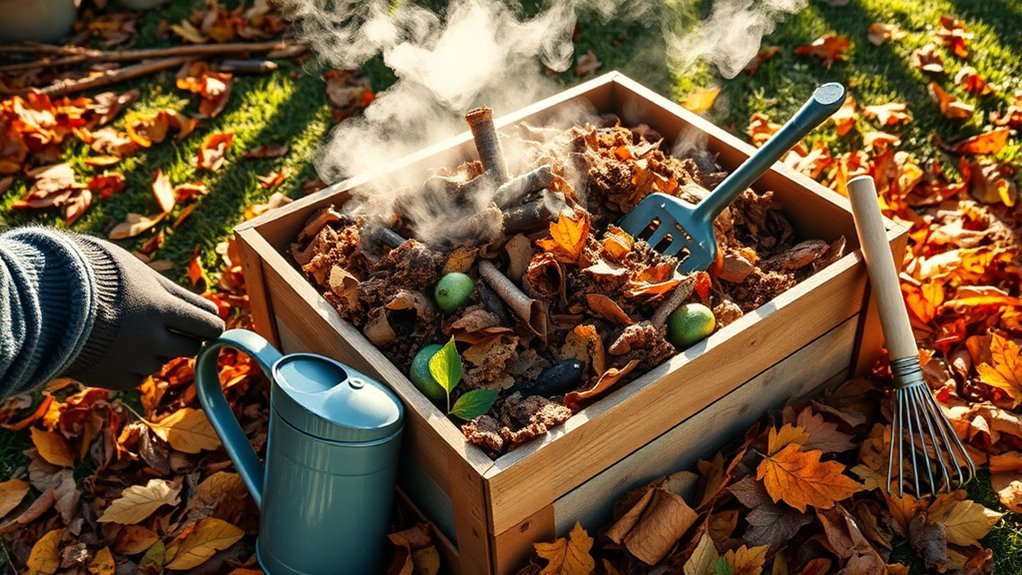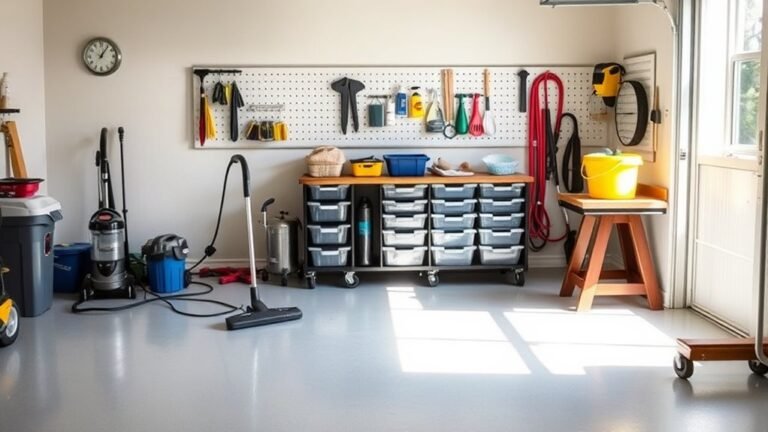Cleaning and Maintaining a Home Composting System
To keep your home compost bin healthy and odor-free, start by emptying and drying it before cleaning. Use a mild soap and scrubbing brush to remove debris, rinse well, and dry completely to prevent mold. Maintain a good balance of green (nitrogen) and brown (carbon) materials, turning the pile regularly for airflow. Adjust care by season—more greens and insulation in winter, frequent turning in summer. If you want tips on solving common compost issues and seasonal care, keep exploring further guidance.
Preparing Your Compost Bin for Cleaning

Before you start cleaning your compost bin, make certain it’s completely emptied and dry. This step frees you from dealing with messy leftovers and lets you focus on a thorough bin inspection. Check for cracks, holes, or any signs of wear that might affect your composting freedom. Having the right cleaning tools ready is essential—grab a stiff brush, gloves, and a mild soap solution. These tools give you control and efficiency, helping you tackle built-up residue without hassle. Taking the time to prepare your bin properly guarantees the cleaning process goes smoothly and extends the life of your compost system. By staying organized and attentive now, you’re setting yourself up for composting success with minimal interruptions.
Step-by-Step Cleaning Process
A thorough cleaning starts with loosening any stuck-on debris inside your compost bin. Grab your cleaning tools—like a sturdy brush and a scraper—to gently remove buildup without damaging the bin. Next, rinse the interior with water, avoiding harsh chemicals to protect compost safety and beneficial microorganisms. If you spot stubborn residue, a mixture of water and mild soap works well; just rinse thoroughly afterward. Dry the bin completely to prevent mold and odors. Remember, wearing gloves during this process safeguards your hands and keeps things hygienic. Finally, inspect the bin’s vents and hinges, clearing any blockages to maintain airflow. Following these steps lets you keep your compost bin fresh and functional, giving you the freedom to enjoy a clean, eco-friendly system.
Identifying and Solving Common Composting Problems

Why is your compost pile not breaking down as quickly as you’d expect? Often, it’s due to moisture imbalance or poor aeration. If you notice foul odor issues, it usually means your pile is too wet or packed too tightly. Turn it regularly to improve airflow and add dry materials if needed. Pest prevention is another key factor—avoid adding meats or oily foods that attract unwanted visitors. Covering food scraps with brown materials like leaves can also help keep pests away. If pests persist, secure your bin with a tight lid and check for holes or cracks. By staying attentive to these common problems, you’ll keep your compost healthy and free, turning waste into nutrient-rich soil faster than you thought possible.
Maintaining the Right Balance of Greens and Browns
Since the balance between greens and browns directly affects how well your compost breaks down, it’s important to get it right. You’ll want to maintain proper compost ratios, focusing on carbon and nitrogen sources. Browns, like dry leaves and cardboard, provide carbon, while greens, such as kitchen scraps and fresh grass clippings, supply nitrogen. Too many greens can make your compost soggy and smelly, while too many browns slow decomposition. Aim for roughly a 30:1 carbon to nitrogen ratio to keep things efficient and odor-free. By regularly adding both types in balanced amounts, you give your compost the freedom to transform waste into rich soil without hassle. Keeping this balance makes your maintenance easier and guarantees your system thrives naturally.
Seasonal Tips for Compost Bin Care

Keeping a good balance of greens and browns sets the stage for successful composting year-round. As the seasons change, you’ll want to adjust how you care for your compost bin to keep things thriving. In winter composting, your pile slows down, so add more greens to boost microbial activity and insulate it with straw or leaves to retain warmth. Don’t forget to keep the lid secure to prevent excess moisture from snow or rain. Come summer, focus on summer aeration by turning your compost more often to speed up decomposition and prevent odors. Opening the bin helps release heat and adds oxygen, fueling the microbes. With simple seasonal tweaks, your compost stays healthy and productive, freeing you from waste and enriching your garden all year long.
Frequently Asked Questions
Can I Compost Meat and Dairy Products Safely?
You might want to avoid meat composting and dairy composting in your home system since they can attract pests and cause odors. However, if you’re set on it, consider using a specialized compost bin designed to handle these foods safely, like a tumbler or bokashi system. These methods help break down meat and dairy without making a mess, letting you compost more freely without worrying about pests or smells.
How Long Does It Take for Compost to Fully Decompose?
Oh, you’re in for a wild ride—watching your compost take forever to decompose is like waiting for a snail to win a marathon. The composting timeline isn’t set in stone; it depends on decomposition factors like temperature, moisture, and what you toss in there. If you’re patient and let nature do its thing, your freedom-loving pile could turn into rich soil in 3 to 6 months. Just don’t rush the magic!
What Are the Best Tools for Turning Compost?
When you’re turning compost, the best tools to grab are a compost aerator or a turning fork. A compost aerator lets you easily poke and mix the pile, giving it the oxygen it craves to break down faster. If you want more control and muscle, a turning fork is perfect for flipping and loosening the compost. Both tools help you speed up decomposition while keeping things fresh and free-flowing.
Can Compost Be Used Directly as Garden Soil?
You can use compost directly as garden soil because it’s packed with nutrients that boost soil enrichment. Compost benefits your garden by improving soil structure, retaining moisture, and providing essential nutrients for plants. However, if it’s not fully decomposed, it might harm seedlings. So, you’ll want to make sure your compost is dark, crumbly, and earthy-smelling before spreading it freely. That way, your garden thrives with minimal fuss.
How Do I Prevent Pests From Accessing My Compost?
Like guarding a treasure in an ancient castle, you’ll want to use pest deterrents to keep unwanted visitors away from your compost. Setting up compost barriers, such as tight-fitting lids or wire mesh, acts like a moat, preventing critters from sneaking in. You can also layer food scraps with dry materials to reduce odors that attract pests. By doing this, you’re protecting your compost freedom, ensuring it stays healthy and productive.






